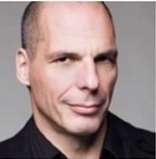 The Official Monetary and Financial Institutions Forum (OMFIF) has released an audio recording of an interview of the former finance minister of Greece, Yanis Varoufakis. The interview seems to have been recorded immediately after Varoufakis’ resignation, yet to have remained unavailable to the public over the intervening weeks.
The Official Monetary and Financial Institutions Forum (OMFIF) has released an audio recording of an interview of the former finance minister of Greece, Yanis Varoufakis. The interview seems to have been recorded immediately after Varoufakis’ resignation, yet to have remained unavailable to the public over the intervening weeks.
The Greek newspaper Kathimerini published much of the transcript on July 26,, and in response OMFIF made the full transcript available the following day. How Kathimerini got its information isn’t clear, although on the tapes there is some half-joking discussion of how many people are in on the conference call and how any of them could tell afriend….
The Chathan House Rule ain’t what it used to be.
But: What is the OMFIF?
Despite the O at the start of its name, the OMFIF isn’t especially ‘official.’ Its website describes it as an ”independent platform for dialogue and research” that has been around for five years now and that includes both public and private sector member institutions.
Regardless … the OMFIF has provided the world with this fascinating conversation, a chat with a man who served for a little more than five months in one of the most high-visibility posts in Europe. He seems to be working on his memoirs and giving us a peak at an early draft. If the OMFIF aspires to household-name status, it may have taken a step in that direction.
As our readers surely remember, on July 5 the voters of Greece said “no” to a bail-out deal then on the table. The vote wasn’t close (a 61/39 split). Varoufakis left the government the following day. Almost anything else one might say about the connection between those two events is a matter of continuing contention. Let’s not go there.
But the five month period during which Varoufakis was the public face of Greece in a tense stand-off with the Troika will continue to resonate for some time with present-tense lessons for alpha seekers. So let’s go there.
What Was the Mandate?
The conversation begins with Varoufakis discussing the issue of the “mandate.” In republics, elected governments are generally said to have a “mandate” from the voters to pursue the policies on which they premised a succesful campaign. The whole idea of a “mandate” is a lot more complicated than it is usually made out to be, and it is a mandelbrot-set of complexity in the case of Parliamentary coalition politics like those that played themselves out after the January ’15 election in Greece.
Varoufakois says, “I have to admit, we did not have a mandate for bringing Greece out of the euro.” The new government did have a mandate, though, to negotiate a new arrangement with the Troika that would have given Greece a more sustainable position “within the eurozone.”
That is to state, in very brief compass, the irony of the coalition’s situation. Good negotiations require the ability to walk away from the table. “You don’t want to give me more than $5 for my wood carving of a nutmeg? The heck with you! I’ll sell elsewhere” the entrepreneur/carver says, and walks away. Varoufakis is saying tha the mandate was, “yes, negotiate a better deal for our carvings but, no, don’t walk away from the table.”
The interviewer immediately presses this point. “You obviousn’t didn’t have a Plan B,” until the “last couple weeks” of Varoufakis’ tenure, by which time it was too late. “You said, ‘don’t worry, we’re not going to leave.’” For too long.
Secret Team, Secret Plan
This is where the discussion took an unexpected turn. Varoufakis said that he did have a Plan B, at least one in development and one that, by the end, was tolerable complete as a blueprint. Specifically even before the election the prime-minister-to-be had “given me the green light” to come up with a plan for walking away from the Eurozone’s table.
Varoufakis said, further, that in response to Tsipras’ encouragement, he had created a very small and secret team, whose work “had to be kept completely under wraps for obvious reasons.”
The work was “more or less complete” before the final showdown. In order to go further, Varoufakis would have had to get another green light, to expand the planning from the 5 people who been working this far to the thousand people who would have been involved in its implementation. That second green light never came.
Later, and prompted to look forward, Varoufakis says that his great worry “on behalf of Euclid” is that the IMF and other counter-partes “are engaged in a game that is the opposite of straightforward.” The ESM will supply a critical loan only if the IMF is on board.
Looking forward, and under the prompting of the interviewer, Varoufakis starts talking about France at about 13 minutes nto the 23:35 recording. In Part Two of this discussion I’ll have a bit to say about that.



